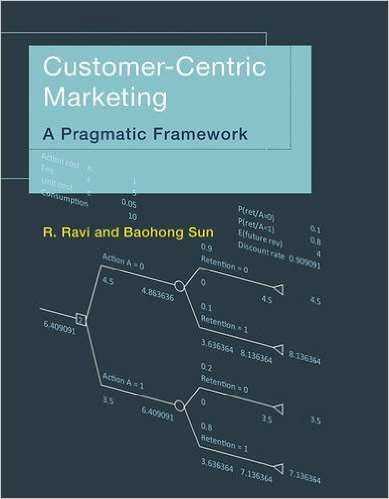
A new book co-written by professors from the Cheung Kong Graduate School of Business and Carnegie Mellon University breaks new ground in an effort to help marketers effectively leverage the flood of data available through a growing array of digital and mobile devices.
Designed as a textbook for MBA students and due out March 4, 2016, “Customer-Centric Marketing: A Pragmatic Framework” (MIT Press), argues that companies can boost profit by embracing a data-driven, long-term view of the consumer. Co-written by Sun Baohong, the Dean’s Distinguished Chair Professor of Marketing at CKGSB in Beijing, and R. Ravi, Andris Z. Zoltners Professor of Business, Rohet Tolani Distinguished Professor and professor of operations research and computer science at Carnegie Mellon’s Tepper School of Business, the work offers an alternative to the long-popular marketing practice of basing customers’ candidacy for campaigns on their most recent, frequent or lucrative transactions.
The 128-page book’s central idea is that practitioners need to leverage data to tailor a consumer-centric marketing plan to an individual customer’s evolving long-term interactions over a long period – perhaps even many years.
“We don’t view consumers as a group or a segment with similar demographics,” Professor Sun said. “The concept of one-on-one interactive marketing is that you truly should be the butler of each individual consumer. You care about learning how they evolve, how they grow, their future needs, their learning ability, and making real-time marketing interventions along the development path,” she said.
“And if you best serve them, in return the consumers will become more loyal, purchase more, pay more, and hence contribute higher customer lifetime value.”
The book, which can be ordered on Amazon before the release date, is based on research developed when Professor Sun and Professor Ravi both were on the faculty of the Tepper School of Business. An early version of the book was used as a text for MBA courses at Carnegie Mellon and Indiana University.
Unveiling state-of-the-art analytic and quantitative methods for customer-centric marketing, the book is meant for marketers looking for ways to help companies achieve profitable growth. In recent years, especially since the 2008 recession, many companies have sought to enhance profitability by focusing on securing cost efficiencies. Thus, it is important to sustain a long-term relationship with individual customers. But rather than using a snapshot from data to plot a single campaign-centric marketing plan, marketers must focus on maximizing long-term profit from data collected over time, according to the book.
“We’re trying to find that sweet spot between just talking about the change in perspective from campaign to consumer-centric and doing something concrete about effecting this change,” Professor Ravi said. “A lot of people do that, but they don’t back it up with something they can do right away with the data sets they have to make this change in orientation.’’
Four mini case studies help readers apply the proposed framework of customer-centric marketing to real-world marketing problems. Students practice problem formulation, develop problem-solving skills and gain experience at using analytical marketing tools to reach day-to-day marketing decisions.
Examples with spreadsheets are provided to illustrate basic optimization primitives used in marketing.
The book’s publication is timely given that firms increasingly are collecting data in a unified way that fits with this type of analysis. Professor Ravi said: “Up to now, the data was in bits and pieces and in different systems.”
The work, he said, could be helpful to executives confronting a business landscape made more competitive with the entry of countless mobile and e-commerce players.
“It’s more important than ever for a company to be innovative,” Professor Sun said. “Record their digital footprint, analyze their individual preference and act on their individual consumer preference. It’s going to help a company to survive in the future.”